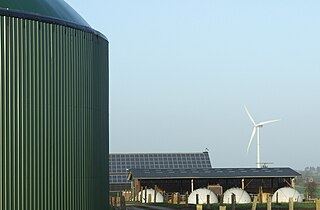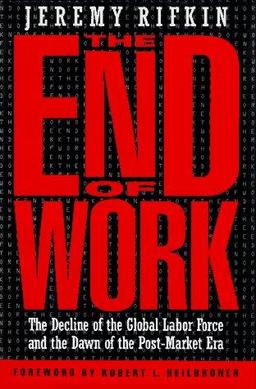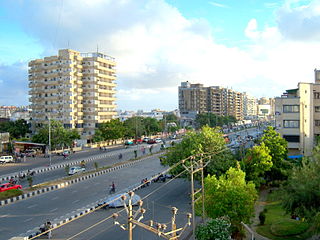
The economy of Germany is a highly developed social market economy. It has the largest national economy in Europe, the fourth-largest by nominal GDP in the world, and fifth by GDP (PPP). In 2017, the country accounted for 28% of the euro area economy according to the International Monetary Fund (IMF). Germany is a founding member of the European Union and the Eurozone.

Pessimism is a negative mental attitude in which an undesirable outcome is anticipated from a given situation. Pessimists tend to focus on the negatives of life in general. A common question asked to test for pessimism is "Is the glass half empty or half full?"; in this situation, a pessimist is said to see the glass as half empty, while an optimist is said to see the glass as half full. Throughout history, the pessimistic disposition has had effects on all major areas of thinking.

Jeremy Rifkin is an American economic and social theorist, writer, public speaker, political advisor, and activist. Rifkin is the author of 23 books about the impact of scientific and technological changes on the economy, the workforce, society, and the environment. His most recent books include The Age of Resilience (2022), The Green New Deal (2019), The Zero Marginal Cost Society (2014), The Third Industrial Revolution (2011), The Empathic Civilization (2010), and The European Dream (2004).
A green economy is an economy that aims at reducing environmental risks and ecological scarcities, and that aims for sustainable development without degrading the environment. It is closely related with ecological economics, but has a more politically applied focus. The 2011 UNEP Green Economy Report argues "that to be green, an economy must not only be efficient, but also fair. Fairness implies recognizing global and country level equity dimensions, particularly in assuring a Just Transition to an economy that is low-carbon, resource efficient, and socially inclusive."

A steady-state economy is an economy made up of a constant stock of physical wealth (capital) and a constant population size. In effect, such an economy does not grow in the course of time. The term usually refers to the national economy of a particular country, but it is also applicable to the economic system of a city, a region, or the entire world. Early in the history of economic thought, classical economist Adam Smith of the 18th century developed the concept of a stationary state of an economy: Smith believed that any national economy in the world would sooner or later settle in a final state of stationarity.

Although the European Union has legislated, set targets, and negotiated internationally in the area of energy policy for many years, and evolved out of the European Coal and Steel Community, the concept of introducing a mandatory common European Union energy policy was only approved at the meeting of the European Council on October 27, 2005 in London. Following this the first policy proposals, Energy for a Changing World, were published by the European Commission, on January 10, 2007. The most well known energy policy objectives in the EU are 20/20/20 objectives, binding for all EU Member States. The EU is planning to increase the share of renewable energy in its final energy use to 20%, reduce greenhouse gases by 20% and increase energy efficiency by 20%.

Renewable energy in Germany is mainly based on wind and biomass, plus solar and hydro. Germany had the world's largest photovoltaic installed capacity until 2014, and as of 2021 it has over 58 GW. It is also the world's third country by installed total wind power capacity, 64 GW in 2021 and second for offshore wind, with over 7 GW. Germany has been called "the world's first major renewable energy economy".

Renewable energy commercialization involves the deployment of three generations of renewable energy technologies dating back more than 100 years. First-generation technologies, which are already mature and economically competitive, include biomass, hydroelectricity, geothermal power and heat. Second-generation technologies are market-ready and are being deployed at the present time; they include solar heating, photovoltaics, wind power, solar thermal power stations, and modern forms of bioenergy. Third-generation technologies require continued R&D efforts in order to make large contributions on a global scale and include advanced biomass gasification, hot-dry-rock geothermal power, and ocean energy. As of 2012, renewable energy accounts for about half of new nameplate electrical capacity installed and costs are continuing to fall.

Jeremy Leggett is a British social entrepreneur and writer. He founded and was a board director of Solarcentury from 1997 to 2020, an international solar solutions company, and founded and was chair of SolarAid, a charity funded with 5% of Solarcentury's annual profits that helps solar-lighting entrepreneurs get started in Africa (2006–2020). SolarAid owns a retail brand SunnyMoney that was for a time Africa's top-seller of solar lighting, having sold well over a million solar lights, all profits recycled to the cause of eradicating the kerosene lantern from Africa.

The End of Work: The Decline of the Global Labor Force and the Dawn of the Post-Market Era is a non-fiction book by American economist Jeremy Rifkin, published in 1995 by Putnam Publishing Group.

The terms transition town, transition initiative and transition model refer to grassroot community projects that aim to increase self-sufficiency to reduce the potential effects of peak oil, climate destruction, and economic instabilitythrough renewed localization strategies, especially around food production and energy usage. In 2006, the founding of Transition Town Totnes in the United Kingdom became an inspiration for other groups to form. The Transition Network charity was founded in early 2007, to support these projects. A number of the groups are officially registered with the Transition Network. Transition initiatives have been started in locations around the world, with many located in the United Kingdom and others in Europe, North America and Australia. While the aims remain the same, Transition initiatives' solutions are specific depending on the characteristics of the local area.

The economy of Gujarat, a state in Western India, has significant agricultural as well as industrial production within India. Major agricultural produce of the state includes cotton, groundnuts (peanuts), dates, sugar cane, milk and milk products. Gujarat is one of the most industrialised states, with significant presence in pharma, chemicals, refining and petrochemicals, ceramics, textiles, automobile etc. sectors. Gujarat recorded the lowest unemployment rate in India in 2015, with 1.2% of the labour force being unemployed.

A technological revolution is a period in which one or more technologies is replaced by another novel technology in a short amount of time. It is an era of accelerated technological progress characterized by new innovations whose rapid application and diffusion typically cause an abrupt change in society.
Open-source appropriate technology (OSAT) is appropriate technology developed through the principles of the open-design movement. Appropriate technology is technology designed with special consideration to the environmental, ethical, cultural, social, political, and economic aspects of the community it is intended for. Open design is public and licensed to allow it to be used, modified and distributed freely.

The Empathic Civilization: The Race to Global Consciousness in a World in Crisis is a 2010 non-fiction book written by Jeremy Rifkin. It connects the evolution of communication and energy development in civilizations with psychological and economic development in humans. Rifkin considers the latest phase of communication and energy regimes—that of electronic telecommunications and fossil fuel extraction—as bringing people together on the nation-state level based on democratic capitalism, but at the same time creating global problems, like climate change, pandemics, and nuclear proliferation. Rifkin extrapolates the observed trend into the future, predicting that Internet and mobile technology along with small-scale renewable energy commercialization will create an era of distributed capitalism necessary to manage the new energy regime and a heightened global empathy that can help solve global problems.

A circular economy is a model of production and consumption, which involves sharing, leasing, reusing, repairing, refurbishing and recycling existing materials and products as long as possible. CE aims to tackle global challenges as climate change, biodiversity loss, waste, and pollution by emphasizing the design-based implementation of the three base principles of the model. The three principles required for the transformation to a circular economy are: eliminating waste and pollution, circulating products and materials, and the regeneration of nature. CE is defined in contradistinction to the traditional linear economy. The idea and concepts of circular economy (CE) have been studied extensively in academia, business, and government over the past ten years. CE has been gaining popularity since it helps to minimize emissions and consumption of raw materials, open up new market prospects and principally, increase the sustainability of consumption and improve resource efficiency.

The energy transition is the ongoing process of replacing fossil fuels with low carbon energy sources. More generally, an energy transition is a significant structural change in an energy system regarding supply and consumption. The current transition to sustainable energy is largely driven by a recognition that global greenhouse-gas emissions must be brought to zero. Since fossil fuels are the largest single source of carbon emissions, the quantity that can be produced is limited by the Paris Agreement of 2015 to keep global warming below 1.5 °C. Over 70% of our global greenhouse gas emissions result from the energy sector, for transport, heating, and industrial use. Wind power and solar photovoltaic systems (PV) have the greatest potential to mitigate climate change. Since the late 2010s, the renewable energy transition is also driven by the rapidly increasing competitiveness of both. Another motivation for the transition is to limit other environmental impact of the energy industry.

The Fourth Industrial Revolution, 4IR, or Industry 4.0, conceptualizes rapid change to technology, industries, and societal patterns and processes in the 21st century due to increasing interconnectivity and smart automation. The term has been used widely in scientific literature, and in 2015 was popularized by Klaus Schwab, the World Economic Forum Founder and Executive chairman. Schwab asserts that the changes seen are more than just improvements to efficiency, but express a significant shift in industrial capitalism.

Nancy F. Koehn is an author and a business historian at Harvard Business School in Boston, Massachusetts, where she is the James E. Robison Professor of Business Administration, and was a visiting scholar during 2011–2013. She is also a member of Harvard's Faculty of Arts and Sciences, in the Economics Department.
Intelligent information society is a hypothetical social transformation based around communication technology infrastructure and artificial intelligence. In the Fourth Industrial Revolution, the convergence of artificial intelligence, robot technology, big data and software disrupts fields such as labor, welfare, employment, education and defense. In the intelligent information society, data, knowledge and information will supplant traditional production factors and spark revolutionary change across society. The economy will move from a material economy to a service economy and then to a shared economy, with decentralized, or horizontal power structures, and thus greater freedoms. These freedoms will depend on an invigorated civil society to prevent government and/or other concentrated power to dominate.

















